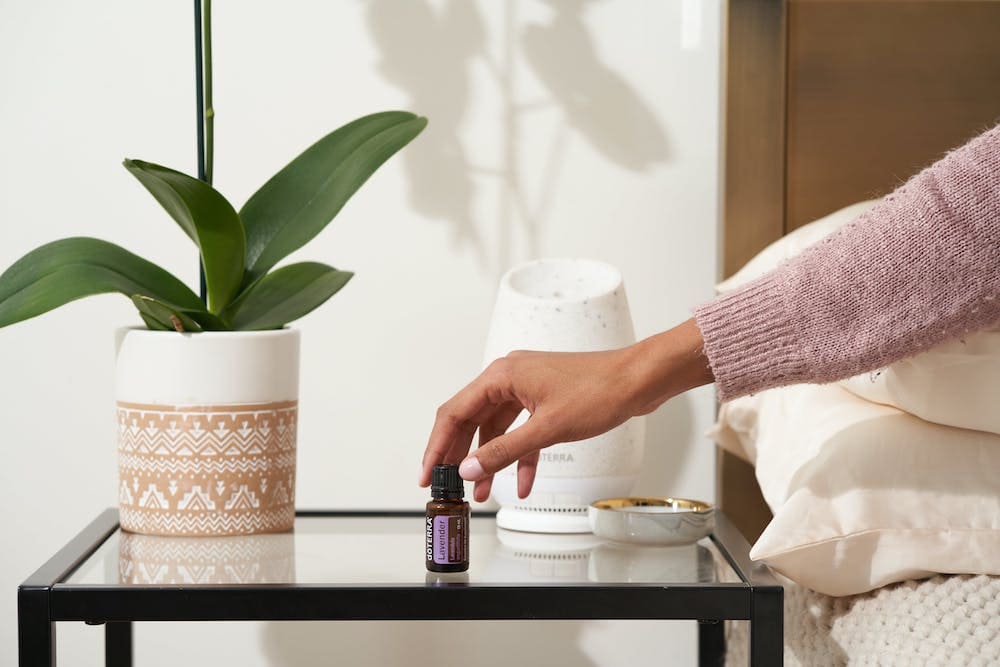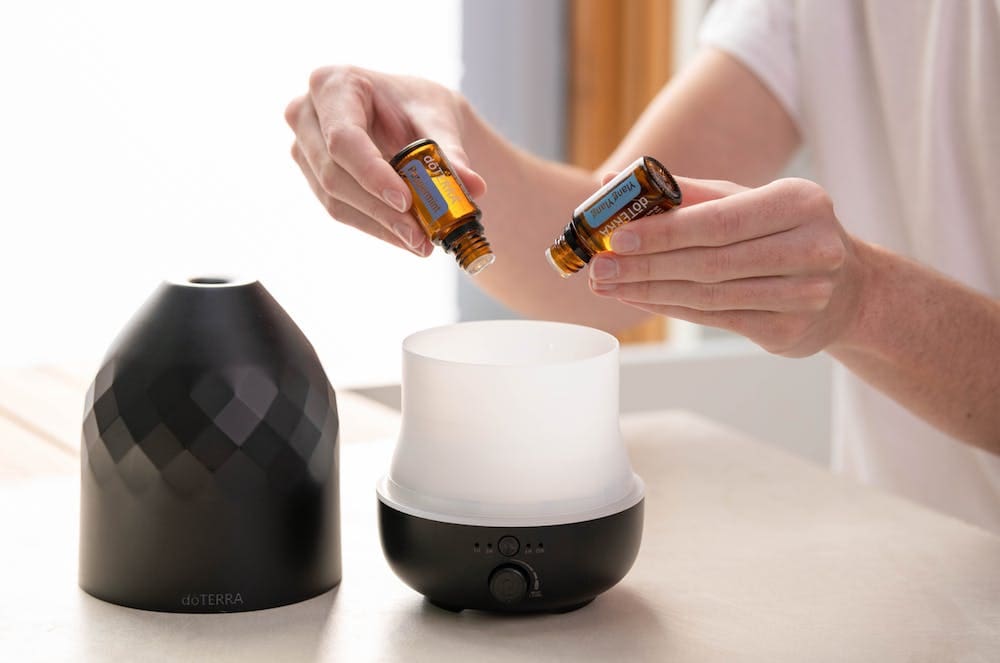Full Disclosure: Clicking on these links could mean a tiny commission for me, at no extra cost to you.
In today’s fast-paced world, achieving a night of restful sleep has become a luxury for many. Aromatherapy is an age-old practice that offers a gentle yet effective approach to enhancing sleep quality. But not all are essential oils are created equal, with each one offering its own individual benefits. In this article, we cover everything you need to know to understand aromatherapy and the best essential oils for sleep.

Understanding Aromatherapy and Sleep
Aromatherapy is an ancient practice rooted in holistic healing. It uses the essence of plants – essential oils – to enhance both physical and psychological well-being. The benefits of using essential oils for sleep gaining attention, especially in the context of our modern, stress-laden lifestyles.
The core of aromatherapy’s effectiveness in promoting sleep lies in its ability to interact with the brain’s emotional center, which plays a critical role in managing stress and anxiety. Both of these are common barriers people experience when trying to achieve restful sleep.
The Link Between Aromatherapy and Sleep
Essential oils for sleep are known for their calming effects on both the mind and body, making them a natural ally in the quest for better sleep. These oils can influence the nervous system in several ways. When inhaled, the scent molecules in essential oils travel from the olfactory nerves directly to the brain and impact the amygdala, the emotional center of the brain.
This interaction can trigger positive emotional responses, such as a sense of calm and relaxation, which are essential for a good night’s sleep.
Additionally, many essential oils possess natural sedative properties that can relax muscles, calm the mind, and set the stage for sleep. They can also balance the body’s hormones and improve the circadian rhythm, further promoting restful sleep.
Scientific Evidence Supporting Aromatherapy for Sleep
In recent years, the scientific community has shown growing interest in validating the benefits of aromatherapy for sleep. Various studies have investigated how different essential oils affect sleep quality and duration.
For instance, research has demonstrated that inhaling lavender oil before bed can not only help individuals fall asleep more quickly but also enhance the quality of sleep. Similarly, studies on oils like chamomile and valerian have shown positive effects in reducing sleep disturbances. One of the key factors highlighted in these studies is the ability of certain essential oils to lower cortisol levels, the stress hormone, which can significantly disrupt sleep patterns.
Additionally, some research points to the potential of aromatherapy in improving sleep for those with sleep disorders, such as insomnia and restless leg syndrome.
These findings provide a scientific basis for the use of aromatherapy as a complementary tool in managing sleep-related issues. The growing body of evidence underscores the potential of essential oils not just in promoting quicker sleep onset but also in enhancing overall sleep quality, making them a valuable addition to sleep hygiene practices.
How to Use Essential Oils for Sleep
Integrating aromatherapy into your nightly routine can be a simple yet transformative step towards better sleep. This section will focus on practical methods of using essential oils to enhance sleep, ensuring safety and maximizing benefits.
Using essential oils at home is both convenient and effective. The importance of choosing high-quality oils and the correct dilution ratios will also be emphasized. Make sure you have an essential oil diffuser to mist the aroma throughout your bedroom to experience the full effects.
Once you have selected your essential oils for sleep, it’s time to add a couple of drops into your diffuser, shut off the lights and enjoy the soothing scent.
You can also use an aromatherapy spray to spritz your bed and pillow with calming essential oils before you go to sleep.

Essential Oils for Better Sleep
The choice of essential oils is crucial in determining the effectiveness of aromatherapy for sleep. This section will introduce the most beneficial essential oils for sleep enhancement, their healing properties and the best ways to use them.
Lavender: The Go-To Oil for Relaxation
Lavender oil, renowned for its soothing scent, stands out as a cornerstone in the realm of aromatherapy, particularly for its sleep-inducing properties. Its popularity in promoting relaxation and sleep is backed by both historical use and contemporary research.
Calming Effects on the Mind and Body
Lavender oil is particularly lauded for its ability to induce calmness and reduce stress. When inhaled, components in lavender oil interact with the limbic system, the brain’s emotional center, to lower anxiety and create a sense of tranquility. This calming effect is beneficial for those who struggle to unwind and relax at the end of the day, setting the stage for a restful night.
Improving Sleep Quality
Studies have shown that lavender oil can improve sleep quality by increasing the duration of deep sleep phases. Its use is linked to not only falling asleep more quickly but also achieving a more restful, uninterrupted sleep. This makes it particularly useful for individuals suffering from insomnia or those who experience frequent night-time awakenings.
Lavender and Anxiety Reduction
Lavender oil’s ability to reduce anxiety is another key factor in its effectiveness for sleep. By alleviating feelings of anxiety and stress, lavender creates an inner sense of peace that is conducive to sleep. This anxiolytic effect also makes it a valuable tool for those whose sleep difficulties are compounded by anxiety disorders.
Other Beneficial Oils for Sleep
While lavender is a star in the sleep-enhancing universe, several other essential oils have been recognized for their sleep-promoting properties.
Chamomile: More Than Just a Tea
Chamomile, widely known for its use in herbal teas, is also effective in essential oil form for inducing sleep. Its mild sedative effect can help calm nerves and reduce anxiety, making it easier to drift off to sleep. Chamomile’s gentle nature makes it suitable even for children and those with sensitive skin when properly diluted.
Bergamot: Balancing Emotions
Bergamot oil, with its citrusy yet warm scent, is unique among citrus oils for its calming properties. It’s known to uplift moods while simultaneously inducing relaxation. Bergamot can help alleviate stress and anxiety, balancing emotions in preparation for sleep. However, it’s photosensitive, so it’s best used in evening routines away from sunlight exposure.
Sandalwood: Deep Relaxation
Sandalwood oil, often associated with meditation and spiritual practices, is another excellent choice for enhancing sleep. Its rich, woody aroma is deeply grounding and can help quiet the mind, making it easier to let go of the day’s stressors. Sandalwood is particularly useful for those who struggle with overthinking or restlessness at bedtime.
While lavender oil remains a popular and effective choice for sleep enhancement, exploring other oils like chamomile, bergamot, and sandalwood can provide a diverse and tailored approach to improving sleep. Each oil offers unique properties that can cater to different aspects of sleep disturbances, whether it’s stress, anxiety, or a restless mind. A combination of these oils, either used alone or blended together, can create a powerful tool in the pursuit of a good night’s rest.
Aromatherapy presents a natural, effective way to enhance sleep quality. By understanding how to properly use essential oils and incorporating them into a comprehensive sleep routine, individuals can experience significant improvements in their sleep. While the effectiveness of aromatherapy can vary from person to person, its overall benefits in promoting relaxation and reducing stress make it a valuable tool in the quest for better sleep.
As with any wellness practice, it’s recommended to approach aromatherapy with mindfulness and consider consulting with a healthcare professional, especially for those with health conditions or sensitivities.








